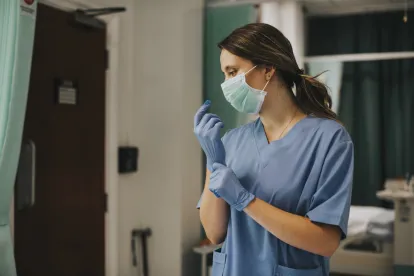On January 31, 2020, the Secretary of the Department of Health and Human Services (“HHS”), Alex M. Azar II, declared a public health emergency due to a virus named SARS-CoV-2 (severe acute respiratory syndrome coronavirus 2), or coronavirus, which causes novel coronavirus disease 2019 (“COVID-19”). In the weeks following the declaration of the public health emergency, the Food and Drug Administration (“FDA”) has issued numerous guidance materials, enforcement policies, and emergency use authorizations (“EUAs”). Many of those materials are focused on medical devices, including personal protective equipment (“PPE”). In this blog, we provide a brief overview of enforcement policies and EUAs that FDA has issued for three primary types of PPE: face masks, face shields, and filtering facepiece respirators.
As background, FDA regulates a product as a medical device, generally, if it meets the definition of a medical device in 21 USC § 321(h). For example, relevant to COVID-19, the definition of a medical device includes products that are “intended for use in the diagnosis of disease or other conditions, or in the cure, mitigation, treatment, or prevention of disease, in man or other animals.” FDA normally regulates surgical masks and respirators intended for medical use as Class II medical devices subject to special controls. The applicable regulation is located at 21 CFR § 878.4040, and medical devices under this regulation ordinarily require FDA premarket notification. Surgical N95 respirators or N95 filtering facepiece respirators that meet certain requirements, however, are exempt from the premarket notification requirement unless intended to treat specific diseases, infections, or labeled for specific tasks outlined in the regulation.
Enforcement Policy for Face Masks and Respirators under COVID-19
FDA issued the Enforcement Policy for Face Masks and Respirators During the Coronavirus Disease (COVID-19) Public Health Emergency, most recently revised April 2020, that explains FDA’s treatment of different categories of face masks and respirators for the duration of the public health emergency. In all cases, FDA recommends healthcare personnel follow guidance prepared by the Centers for Disease Control and Prevention (“CDC”) and that employers comply with the Occupational Safety and Health Administration (“OSHA”) standards. Although beyond the scope of this communication, the policy also addresses the agency’s intended approach for decontamination of face masks and respirators.
FDA will not object to the distribution and use of the following products without compliance with certain regulatory requirements during the public health emergency as long as such products do not present an undue risk:
(1) face masks intended for a medical purpose but not for liquid barrier protection;
(2) face shields; and
(3) surgical masks.
What it means to not pose an undue risk is defined differently for each type of product. The agency also provides a list of the exempted requirements, which include prior submission of a premarket notification (for face and surgical masks); registration and listing requirements; quality system regulation requirements; reports or corrections or removals; and unique device identification requirements. The enforcement discretion for face masks intended for a medical purpose and face shields applies to products used by both medical personnel and the general public.
The policy also provided clarification on FDA’s position when FDA-cleared or National Institute for Occupational Safety and Health (“NIOSH”) approved N95 respirators are not available. The agency “does not intend to object to the distribution (including importation) and use of respirators identified in the CDC recommendations without compliance with the following regulatory requirements . . . .” The policy then provides a list of the exempted requirements, including areas such as registration and establishment requirements and quality systems requirements. Importers, however, are still urged by the agency to “take appropriate steps to verify the authenticity of the products they import.”
Emergency Use Authorizations for Respirators
FDA has issued three EUAs specific to respirators that are only effective for the duration of the public health emergency. The EUAs are limited to use by healthcare personnel in healthcare settings and do not apply to use by the general public. The determination as to which EUA is applicable to a product depends on the type of respirator, location of manufacture, and status of approval received by NIOSH.
Letter of Authorization for NIOSH-Approved Air Purifying Respirators for Use in Health Care Settings During Response to the COVID-19 Public Health Emergency (March 28, 2020)
The first EUA provides for emergency use of “(1) all disposable filtering facepiece respirators (FFRs or respirators) approved by the National Institute for Occupational Safety and Health (NIOSH), in accordance with 42 CFR Part 84, as non-powered air-purifying particulate FFRs, and (2) FFRs that were NIOSH-approved but have since passed the manufacturers’ recommended shelf-life, for use in healthcare settings by [HCP]. . . .” Manufacturers that have products listed as a NIOSH-approved FFR also do not need to take any action under this EUA to submit a request to FDA because FDA will reference the models on the NIOSH website in order to determine eligibility.
Letter of Authorization for Imported, Non-NIOSH Approved Disposable Filtering Facepiece Respirators (March 28, 2020)
The second EUA provides additional pathways for approval by FDA of respirators that do not have NIOSH approval. The second EUA covers non-NIOSH approved disposable filtering facepiece respirators that meet either one of six listed performance standards and/or have one of four listed marketing authorizations. Unlike the EUA for NIOSH-approved respirators, a manufacturer or importer has to request approval under this EUA and provide FDA documentation to demonstrate they meet one of the requirements. Additionally, the FFRs will need to meet the conditions of authorization outlined in the EUA.
Letter of Authorization for Imported, Non-NIOSH Approved Disposable Filtering Facepiece Respirators Manufactured in China (April 3, 2020)
The third EUA, issued on April 3, 2020, directly addressed filtering facepiece respirators manufactured in China that do not have NIOSH approval. There was general confusion in the industry following the issuance of the second EUA that did not include the Chinese standard, KN95, in its list of performance standards. Appendix A to this EUA lists respirators authorized for “use in healthcare settings by healthcare personnel (HCP) when used in accordance with CDC recommendations to prevent wearer exposure to pathogenic biological airborne particulates during FFR shortages.” To be eligible for authorization under the EUA, the respirator must meet one of three criteria for authentication. For example, one criterion includes whether the respirator has a regulatory authorization under a jurisdiction other than China that can be authenticated and verified by FDA. A manufacturer or importer must request this authorization from FDA.
Liability Considerations
A manufacturer or importer could still be subject to liability as part of the chain of commerce if the products cause injury. The Public Readiness and Emergency Preparedness (“PREP”) Act, codified at 42 USC §§ 247d-6d and 247d-6e, authorizes the Secretary of HHS to issue a declaration that provides immunity from liability associated with the use of certain medical countermeasures. The Secretary issued such a PREP Act declaration relating to COVID-19 on March 17, 2020, with retroactive application effective from February 4, 2020. The COVID-19 declaration applies to defined Covered Persons and Covered Countermeasures. Additionally, the Declaration only applies to Covered Countermeasures that proceed through the limited methods of distribution outlined by the Secretary of HHS. Whether this immunity applies will depend on the underlying product, status under FDA regulations, applicability of EUAs, and whether the product proceeds through one of the methods of distribution outlined in the declaration.
Recommendations to Healthcare Providers
- Check if the manufacturer or importer is a registered entity with the FDA using FDA’s own database. Although enforcement policies specific to COVID-19 provide limited enforcement discretion depending on the product, entities including manufacturers, initial importers, and repackers are typically required to register with FDA under 21 CFR § 807.20(a).
- Verify that products listed by the manufacturers correspond with the products for purchase and check the authenticity of any representations made regarding the status of FDA clearance and/or approval.
- For respirators, determine if the products have NIOSH approval, FDA clearance, and/or are subject to temporary exemptions under existing guidance or EUAs for masks and respirators.
- Determine if you are eligible for immunity from liability under the Public Readiness and Emergency Preparedness Act (“PREP”) Act.





 />i
/>i

